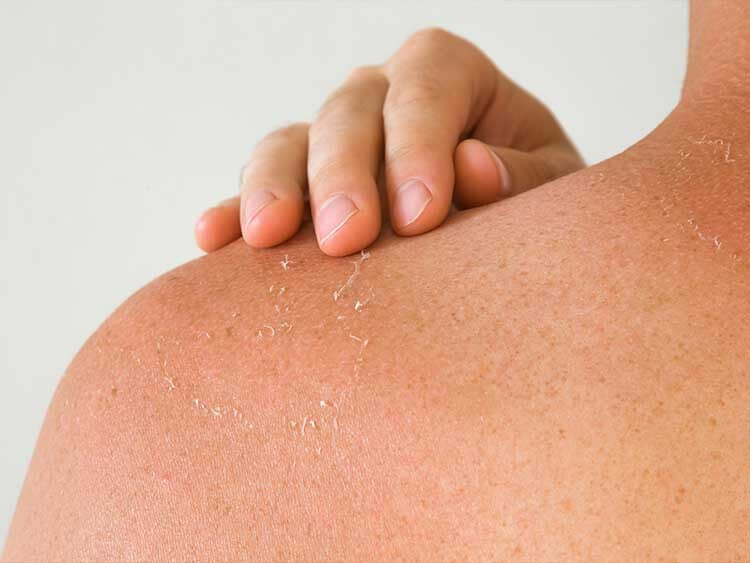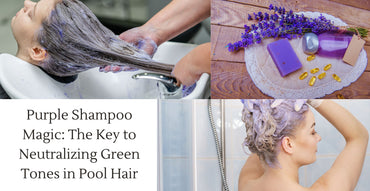We have all used soap to wash our faces at some point but I can share some reasons why soap-based face wash may not be the best option for everyone. Here are five reasons to consider:
-
Soap is a surfactant, which means it can dissolve oils and wash dirt and impurities off the skin. However, it can also deprive the skin of its natural oils, causing it to feel tight, uncomfortable, and dry.
-
The pH balance of our skin naturally shields it from damaging bacteria and other environmental stresses. Because soap is alkaline, it can upset the pH balance of the skin, making it more vulnerable to injury.
-
Using soap-based face wash can aggravate symptoms and lead to additional irritation and inflammation if you have sensitive skin or deal with skin conditions like eczema or rosacea.
-
Face washes with a soap base may have trouble removing makeup, particularly waterproof products or thick foundations. As a result, the skin may accumulate products, which may clog pores and result in breakouts.
-
Soap-based face washes might not be the best choice for your skin type. For instance, a mild, non-soap-based cleanser may be more successful at removing excess oil without stripping the skin if you have oily skin. A soap-based face wash can be too harsh and drying for people with dry or mature skin, aggravating any pre existing issues.
Introduction
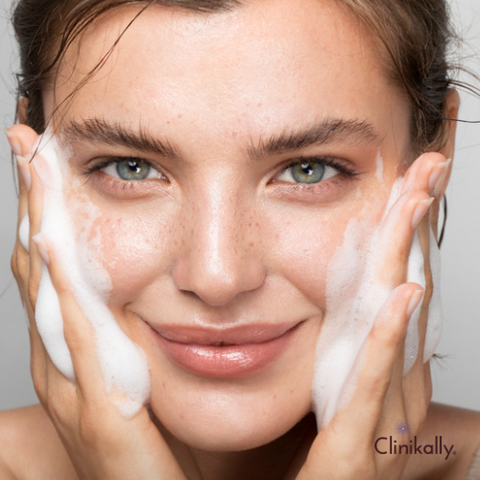
Face washing, or cleansing, is an important part of any skincare routine. A clean face ensures that your pores remain unclogged, that your skincare products absorb better, and that your skin is free of dirt, germs, and bacteria that can cause acne and blackheads. Some people, however, make the mistake of washing their faces with soap. While using soap to clean the body is common, using it to wash the face is not.
The Myth of Soap as a Skincare Staple
The use of soap as a skincare staple is a myth that has persisted for decades. While soap can effectively cleanse the skin of dirt and impurities, it can also cause a number of problems, particularly when used as a facial cleanser on a regular basis. Here are some reasons why soap might not be the best option for your skincare routine:
-
Soap can strip the skin of natural oils: Soap is a surfactant that can remove dirt and impurities from the skin by breaking down oils. It can, however, strip the skin of its natural oils, leaving it feeling dry and tight. This may start a cycle of overproduction of oil in an effort to make up for it, leading to oilier skin.
-
Soap can disrupt the skin's pH balance: Our skin has a natural pH balance that protects it from bacteria and other environmental stressors. Soap is alkaline, which means it can upset the pH balance of the skin and make it more vulnerable to damage. This can lead to dry, irritated skin that is more prone to breakouts.
-
Skin conditions can be made worse by soap: If you have sensitive skin or suffer from eczema or rosacea, using soap to clean your face can make your symptoms worse and cause more irritation and inflammation.
-
Soap may not be effective at removing makeup: Soap-based cleansers may be ineffective at removing heavy makeup or waterproof formulas, resulting in product build-up on the skin and clogged pores.
-
Some skin types may not respond well to soap: Soap-based cleansers might not be the best option for everyone because different skin types have different needs. For instance, a mild, non-soap-based cleanser may be more successful at removing excess oil without stripping the skin if you have oily skin.
The Science Behind Skin Health and pH Balance
The pH balance of the skin is an important factor in skin health, and understanding the science behind it can help you make informed skin care decisions. Here is a brief summary: With a pH range of 4.5–5.5, the skin's natural pH balance is slightly acidic. This acidity helps to maintain the skin's natural barrier function, which is essential for infection prevention, moisture retention, and defence against environmental stressors. When the pH balance of the skin is disturbed, it can cause a variety of problems, including dryness, irritation, inflammation, and an increased risk of infection. This is due to the fact that pH changes can have an impact on the skin's natural flora, which is made up of beneficial bacteria that help to protect the skin.
The following factors can alter the pH balance of the skin:
-
Harsh cleansers: Soap's alkaline nature has the potential to upset the skin's pH balance and strip away natural oils, causing dryness and irritation.
-
Environmental factors: The pH balance of the skin can be impacted by exposure to pollution, UV radiation, and other environmental stressors.
-
Age: Our skin's natural pH balance may change as we get older, which can reduce skin elasticity and increase the risk of infection.
The pH balance of the skin is critical to achieving and maintaining healthy skin. Using skincare products with pH balance that are designed to support the skin's natural barrier function is one way to go about it. It can be beneficial to use products with beneficial ingredients like ceramides and hyaluronic acid, stay away from harsh chemicals, and use gentle cleansers.
How Soap-based Face Wash Can Negatively Affect Your Skin
Soap-based face wash can harm your skin in a variety of ways. Here are some of the most common side effects of using a soap-based face wash on a regular basis:
-
Taking away the skin's natural oils: Because soap is a surfactant, it can dissolve oils and wash away dirt and impurities from the skin. The skin may become tight and dry if the natural oils are stripped away, though. As a result, the skin may overproduce oil in an effort to make up for the situation, which could make the skin even more oily.
-
Changing the pH balance of the skin: Our skin has a natural pH balance that aids in shielding it from dangerous bacteria and other environmental stressors. The pH balance of the skin can be upset by soap's alkaline nature, increasing the risk of injury. This can cause the skin to become dry, irritated, and more prone to breakouts.
-
Drying and irritating the skin: Soap-based face washes can be harsh on the skin, especially if they have sulphates and fragrances in them. This may result in flakiness, redness, and even dryness.
-
Skin conditions getting worse: If you have sensitive skin or deal with eczema or rosacea, using a face wash with soap can exacerbate symptoms and lead to more irritation and inflammation.
-
Incapable of removing dirt and heavy makeup: Soap-based face washes may not be able to remove waterproof makeup or heavy makeup, which can cause a build-up of product on the skin and clogged pores.
The Negative Effects of Soap-based Face Wash
Soap-based face wash can harm your skin in a variety of ways. Here are a few of the most common:
-
Dryness and Tightness: Using a face wash with soap can strip your skin of its natural oils, causing it to feel dry and constrictive. This can dehydrate your skin, which over time can cause flakiness, roughness, and even wrinkles.
-
Disruption of pH Balance: Soap is typically alkaline in nature and has a pH level higher than the natural pH level of our skin. The use of soap-based face washes can cause your skin's pH balance to be out of whack, weaken your skin's protective natural barrier, and increase your risk of bacterial infections by upsetting your skin's natural pH balance.
-
Irritation: The fragrances and sulphates found in soap-based face washes can irritate and trigger allergic reactions in some people, resulting in redness, itching, and swelling.
-
Acne Breakouts: Using a face wash with soap can aggravate acne by clogging your pores and accumulating dirt, oil, and dead skin cells. Blackheads, whiteheads, and pimples may appear as a result of this.
-
Increased Sensitivity: Using a face wash with soap on a regular basis can make your skin more sensitive to irritants like UV rays and other environmental pollutants, which can cause more damage and hasten the aging process.
Dryness and Stripping of Natural Oils
Dryness and the loss of natural oils from the skin are two of the most common side effects of using a soap-based face wash. Soap-based face washes are intended to remove dirt, oil, and impurities from the skin by breaking down the natural oils found on the skin's surface. Some skin types, particularly those that are naturally dry or sensitive, may find this process too harsh. When natural oils are stripped from the skin, the skin can feel tight, rough, and dry. This can result in flakiness, itchiness, and irritation, as well as more severe skin conditions such as eczema or psoriasis. Additionally, when the skin's natural oils are depleted, it may produce too much oil in an effort to make up for the loss, leading to even oilier skin and breakouts.
Irritation and Inflammation
Some people, particularly those with sensitive skin, may experience irritation and inflammation when using a soap-based face wash. This is due to the fact that soap-based face washes frequently contain harsh ingredients such as fragrances, sulphates, and alcohol, which can strip the skin of its natural oils and disrupt its pH balance. This can cause dry, itchy, and irritated skin, as well as redness, swelling, and inflammation in some cases. If you have sensitive skin, you should use a gentle, non-soap-based cleanser that is formulated specifically for your skin type. Look for products that contain soothing ingredients like aloe vera, chamomile, or muesli and are free of harsh ingredients like fragrances, sulphates, and alcohol. It's also a good idea to patch-test any new products before applying them to your entire face and to avoid washing your face with hot water, which can irritate the skin even more.
Clogged Pores and Acne Breakouts
Another disadvantage of using a soap-based face wash is that it can clog pores, resulting in acne breakouts. Soap-based face washes can be too harsh for some skin types, especially acne-prone skin, and can strip the skin of its natural oils, leaving it dry and dehydrated. When the skin is dry and dehydrated, it may overproduce oil to compensate, clogging pores and trapping dirt, oil, and dead skin cells. This can result in blackheads, whiteheads, and pimples, as well as more severe forms of acne such as cystic acne. Choose a gentle, non-soap-based cleanser that is formulated for your skin type to avoid clogged pores and acne breakouts. Look for oil-free and non-comedogenic products that will not clog your pores. It's also important to avoid washing your face with hot water, which can further dry out the skin and aggravate acne. Instead, use lukewarm water to gently massage the cleanser into your skin with your fingertips, then thoroughly rinse and pat dry with a soft towel.
The Harsh Chemicals and Fragrances in Soap-based Cleansers
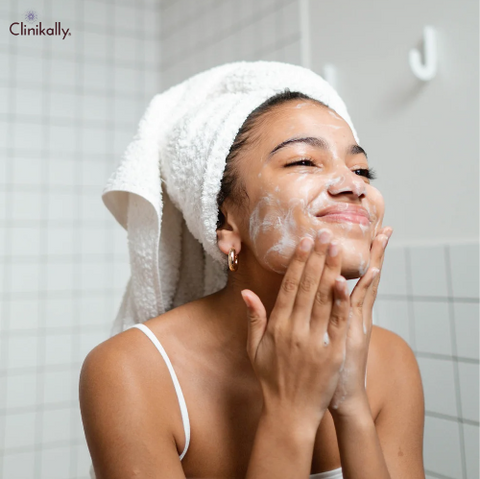
Face washes made of soap frequently contain abrasive chemicals and skin-harming fragrances. Harsh chemicals, such as sulphates and parabens, can deplete the skin's natural oils and disrupt its pH balance, resulting in dryness, irritation, and inflammation. On the other hand, some people may be allergic to or sensitive to fragrances, which can cause rashes, itching, and redness. To avoid the negative effects of these chemicals and fragrances, use a gentle, non-soap-based cleanser free of these ingredients. Look for products that are "fragrance-free" or "sulfate-free," as well as those that contain natural or organic ingredients. Cleansers containing soothing ingredients like chamomile, aloe vera, or green tea extract, for example, can help to calm and soothe the skin.
The Risks of Overusing Antibacterial Properties
Face washes with soap and other skincare products are supposed to have antibacterial properties that kill bacteria and stop infections. While these properties can be beneficial in some situations, such as treating acne or other skin conditions, they can also be harmful to the skin and contribute to the development of antibiotic-resistant bacteria. Chemicals like triclosan, which has been connected to a number of health problems like hormonal imbalances and weakened immune function, are typically the source of antibacterial properties. The natural bacterial balance of the skin can be upset by using these products excessively, which can lead to skin irritability, inflammation, and even infection.
Additionally, some studies contend that regular use of antibacterial products may be ineffective at preventing infection when compared to washing with regular soap and water. This is because excessive use of antibacterial products can result in the growth of bacteria that are resistant to antibiotics, which are more challenging to treat and pose a serious threat to the general public's health.
The Importance of Dermatologist Advice and Alternatives
While many people are tempted to buy skincare products based on popular trends or advertisements, it's important to remember that everyone's skin is different, and what works for one person may not work for another. This is why you should seek the advice of a dermatologist when choosing skincare products, especially if you have a history of skin issues or sensitivities. A dermatologist can assist you in identifying your skin type, as well as any specific concerns or conditions you may have, and can recommend products that are tailored to your specific needs. They can also advise you on how to use these products safely and effectively, and they can check your skin for signs of irritation, inflammation, or other problems.
Choosing the Right Cleanser for Your Skin Type
Choosing the appropriate cleanser for your skin type is critical to keeping your skin healthy and looking its best. Here are some pointers for choosing the best cleanser for your skin type:
-
Normal skin: You can use a mild, non-soap-based cleanser that is appropriate for all skin types if you have normal skin that is neither too dry nor too oily.
-
Dry skin: If you have dry skin, you should select a moisturizing and hydrating cleanser. Choose cleansers with ingredients like glycerin, hyaluronic acid, or ceramides to help keep moisture in and ward off dryness.
-
Oily skin: If you have oily skin, pick a cleanser that is intended to reduce oil production and stop acne. In order to clear clogged pores and lessen breakouts, look for cleansers that are oil-free and contain salicylic acid or benzoyl peroxide.
-
Combination skin: If you have combination skin, you should pick a cleanser that can help control oil production in your T-zone while still being gentle enough to use on all parts of your face. Look for cleansers designed for combination skin or containing tea tree oil or other ingredients that can help regulate oil production.
-
Skin sensitivity: If you have delicate skin, pick a cleanser that is soothing and non-irritating. Look for cleansers without scents and with calming components like chamomile, aloe vera, or oat extract.
Alternative Options for Gentle and Effective Face Cleansing
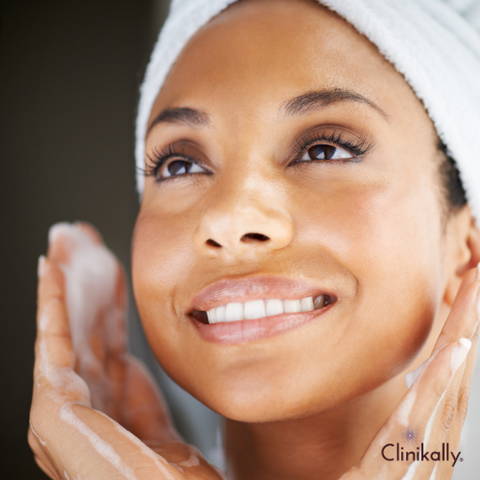
There are several options for gentle and effective face cleansing if you are looking for alternatives. Consider the following options:
-
Oil cleansers: For people with dry or sensitive skin, oil cleansers are a fantastic option. These cleansers gently remove dirt and impurities from the skin using natural oils rather than depleting the skin of its own oils.
-
Micellar water: Micellar water is a popular substitute for conventional cleansers. It employs tiny micelles to lift dirt, makeup, and impurities from the skin, leaving it clean and refreshed.
-
Cream cleansers: For people with dry or sensitive skin, cream cleansers are a gentle option. These creamy-textured cleansers are made to hydrate and nourish the skin while they clean.
-
Gel cleansers: For people with oily or acne-prone skin, gel cleansers are a good option. They aid in clearing the skin of excess oil and impurities while being refreshing and light.
-
Powder cleansers: This unusual option comes in the form of a powder that is activated by water to produce a mild foam. They are a fantastic option for people with sensitive skin because they don't irritate or dry out the skin.
Micellar Water and Cleansing Oils
Micellar water and cleansing oils are two popular, gentle, and effective face-cleansing options.
Micellar water is a gentle, water-based cleanser that removes dirt, oil, and makeup from the skin by using tiny micelles. These micelles are tiny oil molecules that attract and trap dirt and oil, allowing them to be easily removed from the skin without harsh scrubbing or rubbing. Micellar water is typically applied with a cotton pad or swab as a standalone cleanser or as the first step in a double-cleansing routine.
Another gentle option for removing dirt, oil, and makeup from the skin is cleansing oils. These oils are typically made from natural oils such as coconut, jojoba, or argan, which aid in the removal of dirt and impurities from the skin. Cleaning oils, unlike traditional soap-based cleansers, do not strip the skin of its natural oils, making them an excellent choice for those with dry or sensitive skin. Simply massage a small amount of cleansing oil onto dry skin and then rinse with warm water. Micellar water and cleansing oils are both excellent choices for gentle and effective face cleansing. However, it's important to choose a product that is formulated for your skin type and to follow the instructions for use carefully to avoid over-cleansing or over-exfoliating the skin.
Cream Cleansers and Gentle Foaming Cleansers
Other options for gentle and effective face cleansing include cream cleansers and gentle foaming cleansers. Cream cleansers are thicker and more moisturizing than other types of cleansers, making them an excellent choice for people who have dry or sensitive skin. They are made with non-irritating, gentle ingredients that soothe and hydrate the skin while removing dirt and impurities. Cream cleansers can be applied to the skin directly and then removed with water or a damp cloth. For those with sensitive or easily irritated skin, gentle foaming cleansers are another option. These cleansers are designed to produce a light, airy foam that removes dirt and impurities without removing the skin's natural oils. They are less drying than traditional foaming cleansers and are suitable for all skin types. When selecting a cream cleanser or gentle foaming cleanser, look for ingredients that are free of harsh, irritating ingredients such as sulphates, alcohol, and fragrance. You should also consider your skin type and any specific concerns or conditions you may have before selecting a product that is tailored to your specific needs.
Natural Ingredients and DIY Face Wash
Cleaning your face gently and effectively can also be accomplished with a DIY face wash and natural ingredients. Many natural ingredients have gentle, soothing properties that can help cleanse and nourish the skin without removing its natural oils. Honey, aloe vera, coconut oil, and muesli are some popular natural ingredients for face cleansing. These ingredients can be combined in a variety of ways to make DIY face washes tailored to your specific skin type and concerns. Simply combine the ingredients of your choice, apply them to your skin, and gently massage for a few minutes before rinsing with warm water. Remember that natural ingredients can still be irritating or allergenic for some people, so patch-test any new DIY face wash before using it on your entire face. When selecting natural ingredients or DIY face wash, keep in mind that these alternatives may not be as effective as commercially available products. They may also be less convenient or last longer, so you may need to make a new batch of face wash every few days.
Conclusion
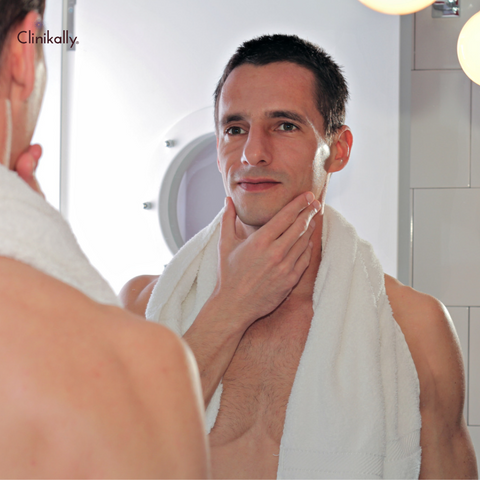
Soap-based face wash can cause skin problems such as dryness, irritation, and clogged pores. It is critical to select a cleanser that is both gentle and effective, as well as one that is tailored to your specific skin type and concerns. For those looking for a gentler way to cleanse their skin, alternatives such as micellar water, cleansing oils, cream cleansers, and gentle foaming cleansers can be excellent choices. Natural ingredients and DIY face wash can also be effective, but be aware of any potential sensitivities or allergies. Overall, using the right cleanser to care for your skin can help you maintain a healthy and balanced complexion.

